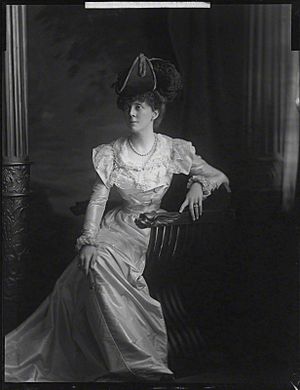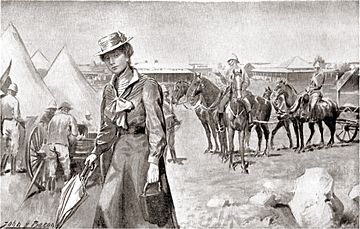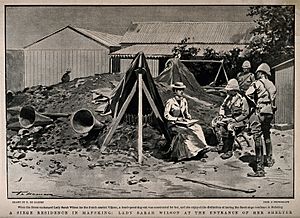Sarah Wilson (war correspondent) facts for kids
Quick facts for kids
Lady Sarah Wilson
|
|
|---|---|

1893 photograph of Lady Sarah by Henry Walter ('H. Walter') Barnett, whole-plate glass negative
|
|
| Born | 4 July 1865 Blenheim Palace, Woodstock, Oxfordshire, England |
| Died | 22 October 1929 (aged 64) London, England |
| Nationality | British |
| Noble family | Spencer-Churchill |
| Spouse(s) |
Gordon Chesney Wilson
(m. 1891; died 1914) |
| Issue | Randolph Gordon Wilson |
| Father | John Spencer-Churchill, 7th Duke of Marlborough |
| Mother | Lady Frances Anne Vane |
| Signature | |
| Occupation | War correspondent |
Lady Sarah Wilson was a brave and adventurous woman. She was born Lady Sarah Isabella Augusta Spencer-Churchill on July 4, 1865. In 1899, she became one of the first female war correspondents. She reported on the Siege of Mafeking for the Daily Mail newspaper. This happened during the Second Boer War in South Africa.
Contents
Lady Sarah's Family Background
Lady Sarah Spencer-Churchill was born at Blenheim Palace in England. She was the youngest of eleven children. Her father was John Spencer-Churchill, 7th Duke of Marlborough. Her mother was Lady Frances Anne Emily Vane.
Her brother, Lord Randolph Churchill, was a famous politician. He was also the father of Winston Churchill. Winston Churchill later became a Prime Minister of the United Kingdom. He also worked as a war correspondent during the Boer War.
In 1891, Lady Sarah married Gordon Chesney Wilson. He was a soldier in the Royal Horse Guards. Gordon was born in Australia. Sadly, he was killed in action in 1914 during the First Battle of Ypres. They had one son named Randolph Gordon Wilson.
Reporting from the Siege of Mafeking
Becoming a War Correspondent
The Daily Mail newspaper hired Lady Sarah as a reporter. Their previous correspondent had been arrested by the Boers. Lady Sarah was already in Mafeking with her husband. He was helping the commanding officer, Colonel Robert Baden-Powell. This made her the perfect person to take over the reporting job.
Colonel Baden-Powell asked her to leave Mafeking for her own safety. The Boers were threatening to attack the town. So, Lady Sarah set off on an exciting journey. She traveled through the South African countryside with her maid.
Captured and Returned
During her travels, the Boers captured her. But she was soon returned to Mafeking. This happened in exchange for a horse thief the British were holding. When she got back, the town had not been attacked as expected. Instead, the people had built many trenches and bomb shelters. These were to protect them from constant shelling.
Life Inside the Siege
While in Mafeking, Lady Sarah also helped at a hospital for injured soldiers. She was even slightly wounded when the hospital was shelled. This happened in January 1900.
She wrote about the daily events in her reports. On March 26, 1900, she wrote:
The Boers have been very active. Yesterday we were heavily shelled and suffered eight casualties.
She chose not to focus too much on the terrible parts of the siege. Instead, she wrote about things like cycling events. She also described the town's celebration of Colonel Baden-Powell's birthday.

However, she often mentioned the dwindling food supplies. The situation seemed hopeless when many people got sick with a fever. Even in this weakened state, the British soldiers fought bravely. They stopped the Boers from taking over the town.
The Siege Ends
The siege lasted for 217 days. It finally ended on May 17, 1900. Soldiers from the Royal Horse and Canadian Artillery rode into Mafeking. Only a few people were there to greet them. They stood in a dusty road, singing "Rule, Britannia!".
But in London, it was a huge celebration. More than 20,000 people filled the streets. They were celebrating the end of the Mafeking siege.
Lady Sarah's Later Life and Honors
Recognized for Her Service
In May 1901, Lady Sarah received a special honor. She was made a Dame of Grace of The Most Venerable Order of the Hospital of Saint John of Jerusalem (DStJ). This recognized her good work. In December of the same year, King Edward VII gave her another award. It was the Royal Red Cross (RRC). This was for her brave service in Mafeking.
World War I and Loss
When the First World War began, Lady Sarah went to France. She helped run a hospital for injured soldiers in Boulogne. While there, she received sad news. Her husband, Gordon, had been killed in battle.
Gordon's brother sent Lady Sarah his personal belongings. In Gordon's writing case, she found a newspaper clipping. It had lines from an old gravestone. Lady Sarah chose some of these lines for Gordon Wilson's headstone. They read: "Life is a city of crooked streets Death the market place where all men meet."


